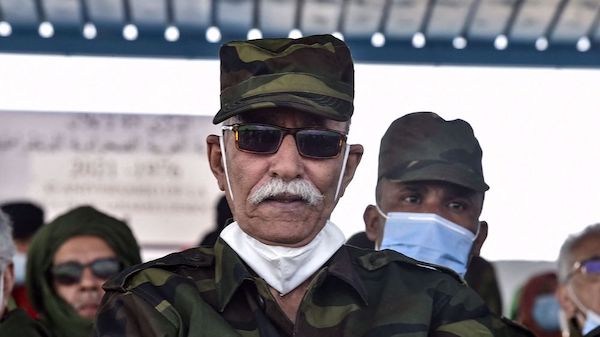
Photo taken on February 27, 2021 shows Brahim Ghali, President of the Sahrawi Arab Democratic Republic (SARD) and Secretary-General of the Polisario front, attending celebrations marking the 45th anniversary of the creation of the SARD, at a refugee camp on the outskirts of the southwestern Algerian city of Tindouf. (File photo by AFP)
Morocco has protested to Spain for allowing the Western Saharan independence movement leader to enter the country allegedly with forged documents amid an escalation of tensions over refugees.
Spainís decision to allow Moroccoís arch-enemy Brahim Ghali, who is secretary-general of Polisario Front and president of the Sahrawi Arab Democratic Republic (SADR), to enter the European country for medical treatment using "fraudulent" traveling papers provided by Algeria, prompted the African country to demand that Madrid conduct an investigation and submit its results to the Moroccan government.
"[C]onditions, circumstances and connivances that led to the fraudulent entry of this person" need to be clarified by Spain, Moroccan Foreign Ministry Director-General Fouad Yazourh said on Saturday.
Meanwhile, media reports said that the 73-year-old Ghali, has been hospitalized at a medical center in the city of Logrono.
Ghali, who has been infected by the coronavirus and suffers from other diseases such as hepatitis C and liver cirrhosis, is said to be in critical condition. He was also operated on for colon cancer.
The Algeria-backed Polisario Front, which represents the indigenous Sahrawi people, seeks the independence of the resource-rich Western Sahara region from Morocco.
The Sahrawi movement, which controls one-fifth of the disputed Western Sahara with additional pockets of control in the Sahrawi refugee camps along the Algerian border, has for decades been aiming to gain international recognition of Western Sahara as an independent Democratic Arab state.
However, negotiations between Morocco and the Polisario under the aegis if the United Nations, with Algeria and Mauritania as observers, have been suspended since March 2019.
Meanwhile, Moroccoís ambassador to Spain, Karima Benyaich, warned on Friday in Rabat that if Spain opted to remove Ghali from Spain with the same "opacity" he was allowed to enter, "it is opting for the stagnation and worsening of bilateral relations."
In a statement read out at the Foreign Ministry in Rabat and after meeting with Moroccan Foreign Minister Nasser Bourita, the ambassador, who was recalled to the Moroccan capital for consultations on Tuesday, did not hesitate to describe the situation in Spanish-Moroccan relations as a "serious crisis."
Benyaich pointed out that what happens with Ghali "is a test for the independence of Spanish justice, in which we have full confidence," but also another test to see whether Spain "chooses to strengthen its relations with Morocco or prefers to collaborate with its enemies."
Tensions have escalated in the region ever since the administration of former US president Donald Trump brokered a deal between Morocco and the Israeli regime late last year on normalizing relations.
As part of the deal, the US agreed to recognize Moroccoís claim over "the entire Western Sahara territory."
Morocco, in recent years, has also gained recognition of its claims over the disputed Western Sahara region from several other countries that opened diplomatic offices there.
The Polisario Front considers the recognition of Moroccan sovereignty over Western Sahara as a "violation of international law and an attack on the legal status of Western Sahara as a non-autonomous territory."
In a related development, Spain accused Morocco of "blackmail" for allowing thousands of refugees to reach the Spanish North African enclave of Ceuta, sparking a crisis that saw clashes on the Moroccan side of the border overnight.
Some 8,000 refugees swam or waded around the border fence to enter Spanish territory from Morocco. Many of the refugees, who were minor, were later returned to Morocco.
A number of refugees drowned.
LINK: https://www.ansarpress.com/english/22484
TAGS:






























 online news tv
online news tv




